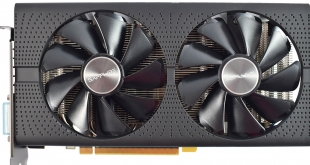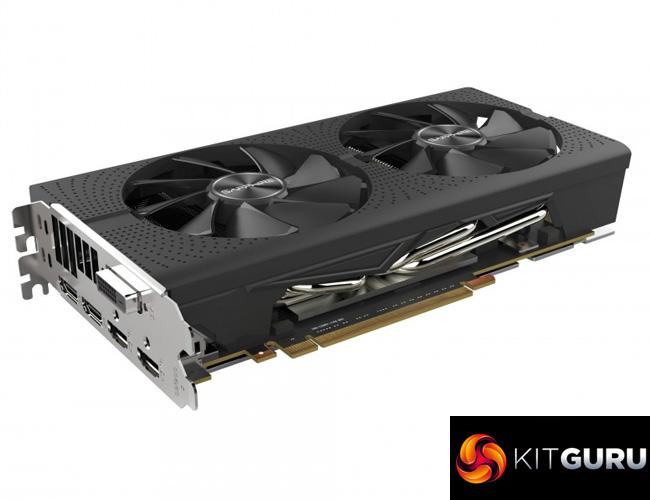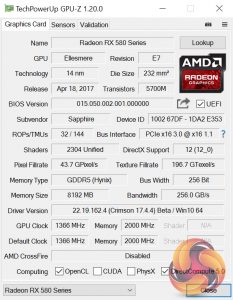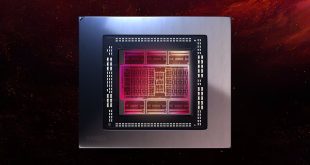
Following on from our launch-day coverage of the RX 500-series, today we analyse another RX 580. This partner card from Sapphire comes attractively priced at £239.99 which could make it a very compelling option for those in the market for a new mid-range graphics card. It does sacrifice some extra features to meet this lower price-point – including RGB LEDs – but can its performance make up for the lost bling?
Launching alongside our review of the Sapphire RX 570 Pulse 4GB card is this review of the RX 580 Pulse 8GB. If you've come straight to this review, it is worth explaining a bit about the Pulse family. Essentially, it is a new product series from Sapphire that aims to keep the solid build quality and performance we expect from Sapphire cards, while ditching some extra, less necessary, features to keep the cost down.
| GPU | AMD RX 480 | AMD RX 580 | AMD RX 470 | AMD RX 570 | AMD R9 390 |
Nvidia GTX 1050 Ti | Nvidia GTX 1060 |
| Streaming Multiprocessors / Compute Units |
36 | 36 | 32 | 32 | 40 | 6 | 10 |
| GPU Cores | 2304 | 2304 | 2048 | 2048 | 2560 | 768 | 1280 |
| Texture Units | 144 | 144 | 128 | 128 | 160 | 48 | 80 |
| ROPs | 32 | 32 | 32 | 32 | 64 | 32 | 48 |
| Base Clock | 1120 MHz | 1257 MHz | 926 MHz | 1168 MHz | Up to 1000MHz | 1290 MHz | 1506 MHz |
| GPU Boost Clock | 1266 MHz | 1340 MHz | 1206 MHz | 1244 MHz | Up to 1000MHz | 1392 MHz | 1708 MHz |
| Total Video memory | 4096 or 8192 MB | 4096 or 8192 MB | 4096 or 8192 MB | 4096 MB | 8192 MB | 4096 MB | 6144 MB |
| Memory Clock (Effective) |
1750 (7000) or 2000 (8000) MHz | 2000 (8000) MHz | 1650 (6600) MHz | 1750 (7000) MHz | 1500 (6000) MHz | 1752 (7008) MHz | 2002 (8008) MHz |
| Memory Bandwidth | 224 or 256 GB/s | 256 GB/s | 211 GB/s | 224 GB/s | 384 GB/s | 112 GB/s | 192 GB/s |
| Bus Width | 256-bit | 256-bit | 256-bit | 256-bit | 512-bit | 128-bit | 192-bit |
| Manufacturing Process | 14nm | 14nm | 14nm | 14nm | 28nm | 16nm | 16nm |
| TDP | 150 W | 185 W | 120 W | 150 W | 275 W | 75W | 120 W |
This particular RX 580 partner card has received a modest factory overclock: up to 1366MHz boost, which is an extra 26MHz over reference speeds.
It is also worth noting some of the features that the Pulse cards do not have. When compared to the Nitro+ series, features that are lacking include:
- Extra LED fans
- Dual-BIOS functionality
- RGB Sapphire logo
- NITRO Boost
- NITRO FanCheck
- NITRO CoolTech (NCT)
- Robust VRM cooling
 KitGuru KitGuru.net – Tech News | Hardware News | Hardware Reviews | IOS | Mobile | Gaming | Graphics Cards
KitGuru KitGuru.net – Tech News | Hardware News | Hardware Reviews | IOS | Mobile | Gaming | Graphics Cards





Good review as always! ;D
Great review thank you. So this card is most likely using up Sapphires remaining 480 chips hence the poor OC the card got or you just got a card that lost the chip lottery. lol
My nitro 480 is rock stable @1415/2050. So probably bad sample or issue is somewhere else.
It’s just the silicon lottery – we can rule out Sapphire re-using a 480 as the 580 is manufacturered with a modified 14nm process so the chips aren’t exactly the same. But it is still the same, overall Polaris architecture.
Yea probably just a bad sample Sapphire is a good company I own 2 TrI-X cards and they have been very solid cards and the Tri-X coolers used on their cards are very well built for sure.
Yep most likely 100% true just the Silicon Lottery and nothing else.
In a nutshell, its about as fast as a overclocked GTX980, pretty decent. Don’t forget folks that RX480/580 actually tends to OC better with lower voltages. The reasoning for not attempting a memory OC is pretty weak though, memory OCing on graphics cards is very easy and not time consuming.
You mention a £239.99 retail price but when I follow your link the card is £449.99 so almost twice this price : any thoughts on that inflation in less than a year ?